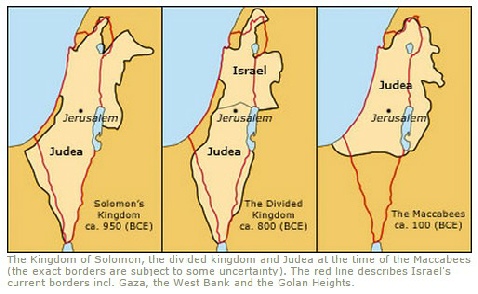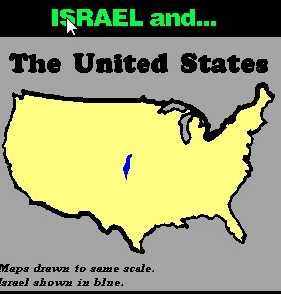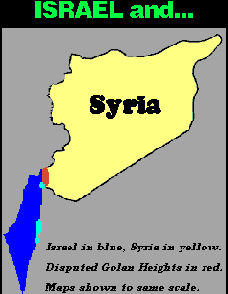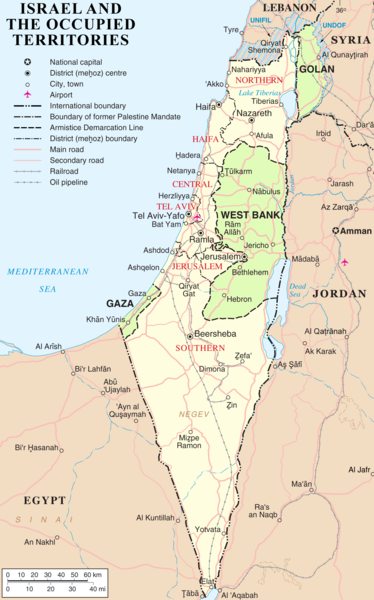Rather than being unjust occupiers of "Palestinian" land, under overt supernatural attestation of Divine command, the Jews conquered a generationally wicked nation group due to being evil, exterminating most (though DNA finds more than
of the genetic ancestry of modern Lebanese being derived from ancient Canaanites, yet genes are not the same as culture, which can radically evolve over the years while genes can remain unchanged), due to disobedience, the Jews lost their historical land to conquerors, and via a succession of which they received most their land back, but not all that was promised them.
Israel existed as a Monarchy under the reigns of Saul, David, and Solomon, yet due to disobedience the country later split into two separate kingdoms: Israel (Ephraim) and Judah. The Northern Kingdom of Israel was destroyed around 720 BCE, being conquered by the Neo-Assyrian Empire. Later, Jewish revolts against the Babylonians led to the destruction of Judah in 586 BCE, under king Nebuchadnezzar II. Neo-Assyrian Empire grew to dominate the ancient Near East throughout much of the 8th and 7th centuries BC and ruled over all of Mesopotamia, the Levant and Egypt, as well as parts of Anatolia, Arabia and modern-day Iran and Armenia.
 Despite being at the peak of its power, the empire experienced a swift and violent fall in the late 7th century BC, destroyed by a Babylonian uprising and an invasion by the Medes, an ancient Iranian people who inhabited an area known as Media between western and northern Iran. In the 7th century BC, all of western Iran and some other territories were under Median rule, but their precise geographic extent remains unknown.[4]
Despite being at the peak of its power, the empire experienced a swift and violent fall in the late 7th century BC, destroyed by a Babylonian uprising and an invasion by the Medes, an ancient Iranian people who inhabited an area known as Media between western and northern Iran. In the 7th century BC, all of western Iran and some other territories were under Median rule, but their precise geographic extent remains unknown.[4]
After the fall of Assyria between 616 BC and 609 BC, a unified Median state was formed, which together with Babylonia, Lydia, and ancient Egypt became one of the four major powers of the ancient Near East. After Cyrus's victory against Astyages, the Medes were subjected to their close kin, the Persians.[
From the early 6th century BC onwards, several Persian states dominated the region, beginning with the Medes and non-Persian Neo-Babylonian Empire, then their successor the Achaemenid Empire known as the first Persian Empire, conquered in the late 4th century BC by the very short-lived Macedonian Empire of Alexander the Great, and then successor kingdoms such as Ptolemaic Egypt and the Seleucid state in Western Asia.
After a century of hiatus, the idea of the Persian Empire was revived by the Parthians in the 3rd century BC—and continued by their successors, the Sassanids from the 3rd century AD. This empire dominated sizable parts of what is now the Asian part of the Middle East and continued to influence the rest of the Asiatic and African Middle East region, until the Arab Muslim conquest of Persia in the mid-7th century AD. Between the 1st century BC and the early 7th century AD, the region was completely dominated by the Romans and the Parthians and Sassanids on the other hand, which often culminated in various Roman-Persian Wars over the seven centuries. Eastern Rite, Church of the East Christianity took hold in Persian-ruled Mesopotamia, particularly in Assyria from the 1st century AD onwards, and the region became a center of a flourishing Syriac–Assyrian literary tradition.
Greek and Roman Empire. In 66–63 BC, the Roman general Pompey conquered much of the Middle East.[21] The Roman Empire united the region with most of Europe and North Africa in a single political and economic unit. Even areas not directly annexed were strongly influenced by the Empire, which was the most powerful political and cultural entity for centuries. Though Roman culture spread across the region, the Greek culture and language first established in the region by the Macedonian Empire continued to dominate throughout the Roman period.
As the Christian religion spread throughout the Roman and Persian Empires, it took root in the Middle East, and cities such as Alexandria and Edessa became important centers of Christian scholarship. By the 5th century, Christianity was the dominant religion in the Middle East, with other faiths (gradually including heretical Christian sects) being actively repressed. The Middle East's ties to the city of Rome were gradually severed as the Empire split into East and West, with the Middle East tied to the new Roman capital of Constantinople. The subsequent Fall of the Western Roman Empire therefore, had minimal direct impact on the region.
Byzantine Empire The Eastern Roman Empire, today commonly known as the Byzantine Empire, ruling from the Balkans to the Euphrates, became increasingly defined by and dogmatic about Christianity, gradually creating religious rifts between the doctrines dictated by the establishment in Constantinople and believers in many parts of the Middle East. By this time, Greek had become the 'lingua franca' of the region, although ethnicities such as the Syriacs and the Hebrew continued to exist. Under Byzantine/Greek rule the area of the Levant met an era of stability and prosperity.
In the 5th century, the Middle East was separated into small, weak states; the two most prominent were the Sasanian Empire of the Persians in what is now Iran and Iraq, and the Byzantine Empire in Anatolia (modern-day Turkey) and the Levant. The Byzantines and Sasanians fought with each other a reflection of the rivalry between the Roman Empire and the Persian Empire seen during the previous five hundred years. The Byzantine-Sasanian rivalry was also seen through their respective cultures and religions. The Byzantines considered themselves champions of Hellenism and Christianity. Meanwhile, the Sasanians thought themselves heroes of ancient Iranian traditions and of the traditional Persian religion, Zoroastrianism.
Territorial wars soon became common, with the Byzantines and Sasanians fighting over upper Mesopotamia and Armenia and key cities that facilitated trade from Arabia, India, and China.[27] Byzantium, as the continuation of the Eastern Roman Empire, continued control of the latter's territories in the Middle East. Since 527, this included Anatolia, Syria, Lebanon, Palestine, and Egypt. But in 603 the Sasanians invaded, conquering Damascus and Egypt. It was Emperor Heraclius who was able to repel these invasions, and in 628 he replaced the Sasanian Great King with a more docile one. But the fighting weakened both states, leaving the stage open to a new power.
The nomadic Bedouin tribes dominated the Arabian desert, where they worshiped idols and remained in small clans tied together by kinship. Urbanization and agriculture was limited in Arabia, save for a few regions near the coast. Mecca and Medina (then called Yathrib) were two such cities that were important hubs for trade between Africa and Eurasia.
While the Byzantine Roman and Sassanid Persian empires were both weakened by warfare (602–628), a new power in the form of Islam grew in the Middle East. In a series of rapid Muslim conquests, Arab armies, led by the Caliphs and skilled military commanders such as Khalid ibn al-Walid, swept through most of the Middle East, taking more than half of Byzantine territory and completely engulfing the Persian lands. In Anatolia, they were stopped in the Siege of Constantinople (717–718) by the Byzantines, who were helped by the Bulgarians.
The Byzantine provinces of Roman Syria, North Africa, and Sicily, however, could not mount such a resistance, and the Muslim conquerors swept through those regions. At the far west, they crossed the sea taking Visigothic Hispania before being halted in southern France in the Battle of Tours by the Franks. At its greatest extent, the Arab Empire was the first empire to control the entire Middle East, as well three-quarters of the Mediterranean region, the only other empire besides the Roman Empire to control most of the Mediterranean Sea.[32] It would be the Arab Caliphates of the Middle Ages that would first unify the entire Middle East as a distinct region and create the dominant ethnic identity that persists today.
Much of North Africa became a peripheral area to the main Muslim centres in the Middle East, but Iberia (Al-Andalus) and Morocco soon broke away from this distant control and founded one of the world's most advanced societies at the time, along with Baghdad in the eastern Mediterranean. Between 831 and 1071, the Emirate of Sicily was one of the major centres of Islamic culture in the Mediterranean. After its conquest by the Normans the island developed its own distinct culture with the fusion of Arab, Western, and Byzantine influences.
Motivated by religion and conquest, the kings of Europe launched a number of Crusades to try to roll back Muslim power and retake the Holy Land. The Crusades were unsuccessful but were far more effective in weakening the already tottering Byzantine Empire. They also rearranged the balance of power in the Muslim world as Egypt once again emerged as a major power.
The dominance of the Arabs came to a sudden end in the mid-11th century with the arrival of the Seljuq Turks, migrating south from the Turkic homelands in Central Asia. They conquered Persia, Iraq (capturing Baghdad in 1055), Syria, Palestine, and the Hejaz. Egypt held out under the Fatimid caliphs until 1169, when it too fell to the Turks.
Despite massive territorial losses in the 7th century, the Christian Byzantine Empire continued to be a potent military and economic force in the Mediterranean, preventing Arab expansion into much of Europe. The Seljuqs' defeat of the Byzantine military in the Battle of Manzikert in the 11th century and settling in Anatolia effectively marked the end of Byzantine power. The Seljuks ruled most of the Middle East region for the next 200 years, but their empire soon broke up into a number of smaller sultanates.
Christian Western Europe staged a remarkable economic and demographic recovery in the 11th century since its nadir in the 7th century. The fragmentation of the Middle East allowed joined forces, mainly from England, France, and the emerging Holy Roman Empire, to enter the region. In 1095, Pope Urban II responded to pleas from the flagging Byzantine Empire and summoned the European aristocracy to recapture the Holy Land for Christianity. In 1099 the knights of the First Crusade captured Jerusalem and founded the Kingdom of Jerusalem, which survived until 1187, when Saladin, the founder of the Ayyubid dynasty, retook the city. Smaller crusader kingdoms and fiefdoms survived until 1291.
Mongol rule... societal clashing occurred between traditionalists who wished to retain their nomadic culture and Mongols moving towards sedentary agriculture. All of this led to the fragmentation of the empire in 1260.
The Mongols eventually retreated in 1335, but the chaos that ensued throughout the empire deposed the Seljuq Turks. In 1401, the region was further plagued by the Turko-Mongol, Timur, and his ferocious raids. By then, another group of Turks had arisen as well, the Ottomans. Based in Anatolia, by 1566 they would conquer the Iraq-Iran region, the Balkans, Greece, Byzantium, most of Egypt, most of north Africa, and parts of Arabia, unifying them under the Ottoman Empire. The rule of the Ottoman sultans marked the end of the Medieval (Postclassical) Era in the Middle East.
The Ottoman Empire (1299–1918)..The Ottomans united the whole region under one ruler for the first time since the reign of the Abbasid caliphs of the 10th century, and they kept control of it for 400 years, despite brief intermissions created by the Iranian Safavids and Afsharids.[38] By this time the Ottomans also held Greece, the Balkans, and most of Hungary, setting the new frontier between east and west far to the north of the Danube. Regions such as Albania and Bosnia saw many conversions to Islam, but Ottoman Europe was not culturally absorbed into the Muslim world.
By 1699, the Ottomans had been driven out of Hungary, Poland-Lithuania and parts of the western Balkans in the Great Turkish War. In the Great Divergence, Europe had overtaken the Muslim world in wealth, population and technology.
The industrial revolution and growth of capitalism magnified the divergence, and from 1768 to 1918, the Ottomans gradually lost territory. Greece, Serbia, Romania, and Bulgaria achieved independence during the 19th century, and the Ottoman Empire became known as the "sick man of Europe", increasingly under the financial control of European powers. Domination soon turned to outright conquest: the French annexed Algeria in 1830 and Tunisia in 1878 and the British occupied Egypt in 1882, though it remained under nominal Ottoman sovereignty. In the Balkan Wars of 1912–13 the Ottomans were driven out of Europe altogether, except for the city of Constantinople and its hinterland.
The British also established effective control of the Persian Gulf, and the French extended their influence into Lebanon and Syria. In 1912, the Italians seized Libya and the Dodecanese islands, just off the coast of the Ottoman heartland of Anatolia. The Ottomans turned to Germany to protect them from the western powers, but the result was increasing financial and military dependence on Germany... Enver Bey's alliance with Germany, which he considered the most advanced military power in Europe, was enabled by British demands that the Ottoman Empire cede their formal capital Edirne (Adrianople) to the Bulgarians after losing the First Balkan War, which the Turks saw as a betrayal by Britain.
The British saw the Ottomans as the weak link in the enemy alliance, and concentrated on knocking them out of the war. When a direct assault failed at Gallipoli in 1916, they turned to fomenting revolution in the Ottoman domains, exploiting the awakening force of Arab, Armenian, and Assyrian nationalism against the Ottomans. The British found an ally in Sharif Hussein, the hereditary ruler of Mecca believed by many to be a descendant of Muhammad, who led an Arab Revolt against Ottoman rule, after being promised independence. .
The Entente, won the war and the Ottoman Empire was abolished with most of its territories ceded to Britain and France; Turkey just managed to survive.The war transformed the region in terms of shattering Ottoman power which was supplanted by increased British and French involvement; the creation of the Middle Eastern state system as seen in Turkey and Saudi Arabia; the emergence of explicitly more nationalist politics, as seen in Turkey and Egypt; and the expansion of oil industry, particularly in the Gulf States.
When the Ottoman Empire surrendered to the Allies in 1918, the Arab patriots did not get what they had expected. Islamic activists of more recent times have described it as an Anglo-French betrayal. The governments of the European Entente had concluded a secret treaty before the armistice, the Sykes–Picot Agreement, between the United Kingdom and France, with assent from the Russian Empire and the Kingdom of Italy, to define their mutually agreed spheres of influence and control in an eventual partition of the Ottoman Empire.
The agreement was based on the premise that the Triple Entente would achieve success in defeating the Ottoman Empire during World War I and formed part of a series of secret agreements contemplating its partition. The agreement allocated to the UK control of what is today southern Israel and Palestine, Jordan and southern Iraq, and an additional small area that included the ports of Haifa and Acre to allow access to the Mediterranean. France was to control southeastern Turkey, the Kurdistan Region, Syria and Lebanon.
As a result of the included Sazonov–Paléologue Agreement, Russia was to get Western Armenia in addition to Constantinople and the Turkish Straits already promised under the 1915 Constantinople Agreement. Italy assented to the agreement in 1917 via the Agreement of Saint-Jean-de-Maurienne and received southern Anatolia.[8] The Palestine region, with a smaller area than the later Mandatory Palestine, was to fall under an "international administration".
Syria became a French protectorate as a League of Nations mandate. The Christian coastal areas were split off to become Lebanon, another French protectorate. Iraq and Palestine became British mandated territories. Iraq became the "Kingdom of Iraq" and one of Sharif Hussein's sons, Faisal, was installed as the King of Iraq. Iraq incorporated large populations of Kurds, Assyrians and Turkmens, many of whom had been promised independent states of their own.
The British had in 1917, endorsed the Balfour Declaration promising the international Zionist movement their support in re-creating the historic Jewish homeland in Palestine. Britain was granted a Mandate for Palestine on 25 April 1920 at the San Remo Conference, and, on 24 July 1922, this mandate was approved by the League of Nations. Palestine became the "British Mandate of Palestine" and was placed under direct British administration. The Jewish population of Palestine, consisting overwhelmingly of recent migrants from Europe, numbered less than 8 percent in 1918. Under the British mandate, Zionist settlers were granted wide rein to immigrate initially, buy land from absentee landlords, set up a local government and later establish the nucleus of a state all under the protection of the British Army, which brutally suppressed multiple Palestinian Arab revolts in the years that followed, including in 1936
The Territory East of the Jordan River and west of Iraq was also declared a British Mandate when the Council of the League of Nations passed the British written Transjordan Memorandum on 16 September 1922. Most of the Arabian peninsula, including the Holy cities of Mecca and Medina, though not incorporated into either a British or French colonial mandate, fell under the control of another British ally, Ibn Saud, who in 1932, founded the Kingdom of Saudi Arabia.
Sources: https://en.wikipedia.org/wiki/History_of_the_Middle_East; https://en.wikipedia.org/wiki/Middle_Eastern_empires; https://en.wikipedia.org/wiki/Sykes%E2%80%93Picot_Agreement


 Source (many more maps): http://www.jewishwikipedia.info/israelmaps.html
Source (many more maps): http://www.jewishwikipedia.info/israelmaps.html 
 Despite being at the peak of its power, the empire experienced a swift and violent fall in the late 7th century BC, destroyed by a Babylonian uprising and an invasion by the Medes, an ancient Iranian people who inhabited an area known as Media between western and northern Iran. In the 7th century BC, all of western Iran and some other territories were under Median rule, but their precise geographic extent remains unknown.[4]
Despite being at the peak of its power, the empire experienced a swift and violent fall in the late 7th century BC, destroyed by a Babylonian uprising and an invasion by the Medes, an ancient Iranian people who inhabited an area known as Media between western and northern Iran. In the 7th century BC, all of western Iran and some other territories were under Median rule, but their precise geographic extent remains unknown.[4]